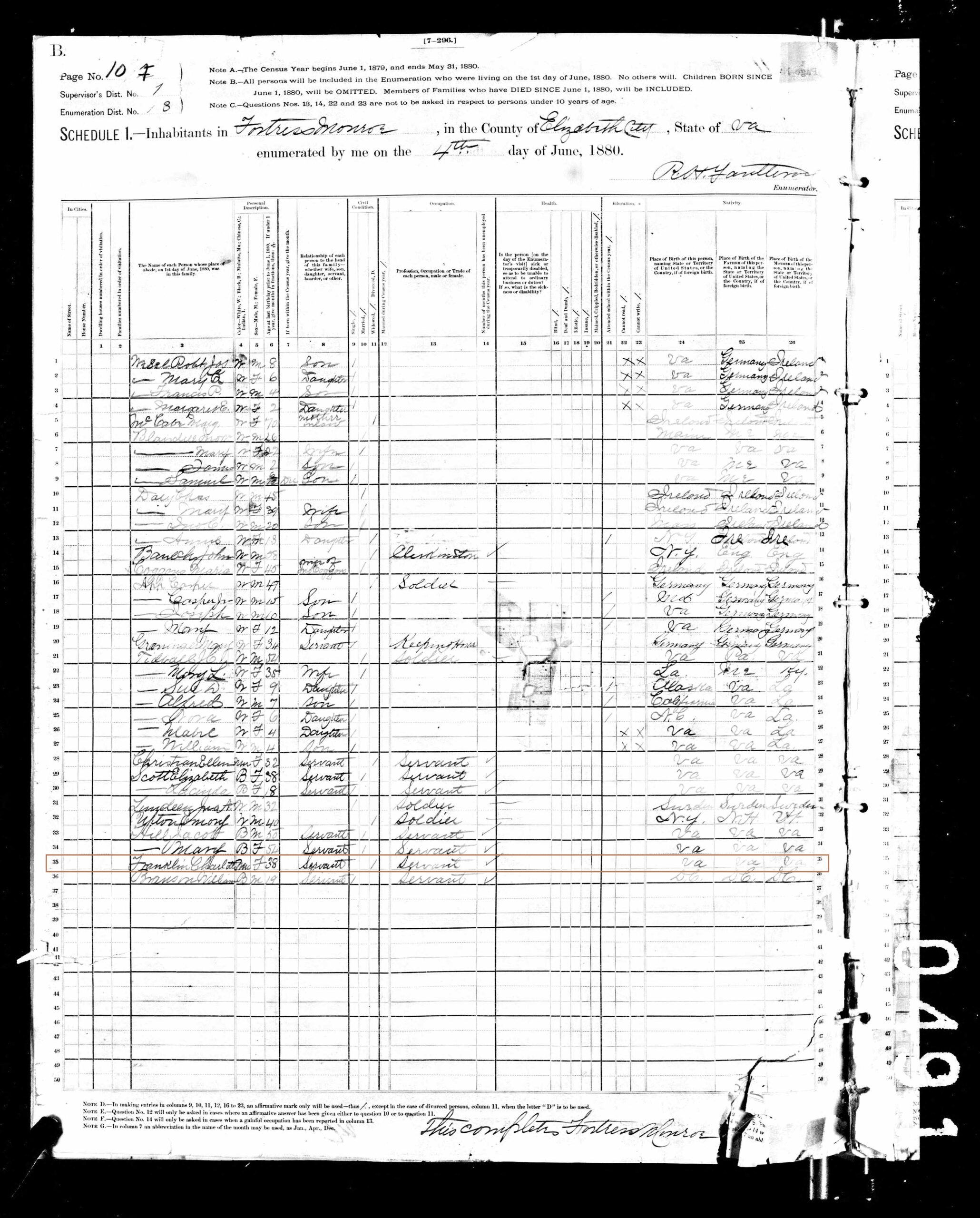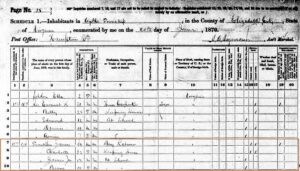
Page showing Charlotte Franklin in the household of Emory Upton, 1880 United States Federal Census.
Charlotte Franklin
We learned of Charlotte Franklin’s presence on Fort Monroe through research for our first iteration of the exhibit “Beyond the Battlefield”, which investigates mental health crises in relation to Fort Monroe and their subsequent treatment. In researching the life of Emory Upton, a prolific military strategist, we examined the 1880 census. Emory Upton was living on Fort Monroe and his household included four servants, Charlotte Franklin being one of them. In 1880, Charlotte Franklin was recorded as a 38-year-old widow. We know from the information collected by census takers that Charlotte, her mother, and her father were all born in Virginia.
Research Trail:
Using the information gleaned from the 1880 census, we sought to find Charlotte Franklin in the 1870 census. We used ancestry.com to search for “Black” and “Mulatto” women born in 1842 (give or take a year) in Virginia. Whether a person was recorded as Black or Mulatto in the census was totally subjective and determined by the individual census taker, therefore while Charlotte Franklin was identified as “mulatto” in 1880, this does not mean that she would be in every census in which she appeared. Ages, especially for Black folks under slavery, must be taken with a grain of salt. Exact birthdates were frequently not recorded or manipulated to make enslaved people appear to be older or younger.
Using this information, two women seemed to be good matches: one Charlotte Franklin living in Austin, Texas in 1870, and one Charlotte Franklin living in Eufaula, Alabama. Both of these women are the correct age to be “our” Charlotte Franklin, and both women were born in Virginia. The Charlotte Franklin of Austin, Texas was working as a domestic servant in 1870 and she is noted as being able to read, but not write. Charlotte Franklin of Eufaula was “keeping house” in 1870 and married to a man named Anthony Franklin, a 34-year-old carpenter. Both Charlotte and Anthony are listed as unable to read or write. With such limited information, it is impossible to say for sure if either of these women are the Charlotte Franklin who was employed as a domestic servant on Fort Monroe in 1880. Could the Charlotte of Eufaula’s husband Anthony have died forcing Charlotte to return to her home state and find employment in the home of Emory Upton? Marital status is not listed for the Charlotte Franklin of Texas, but it is possible that she married and became a widow between 1870 and her move to Virginia.

Further researched revealed a Charlotte Franklin who may be the best match, despite some mismatched information. Charlotte and James Franklin, 32 and 34 years of age respectively, were living in Wythe, Elizabeth City, Virginia in 1870. This Charlotte Franklin would have been born in about 1838. It is perfectly reasonable that the census taker in 1870 or in 1880 recorded her age incorrectly. Charlotte Franklin of Wythe was also “keeping house” in 1870 while James worked as a day laborer. Both of their children, 12-year-old son, James, and 10-year-old daughter, Berry, were enrolled in school. While both James and Charlotte are noted as being unable to read or write, both of their children were receiving formal education, exemplifying the opportunities afforded to southern Black children during Reconstruction.
The story of Charlotte Franklin exemplifies the difficulty of researching the histories of folks relegated to the periphery of society. Charlotte Franklin is defined through her relationship to a white man with high social status through his military achievements. As such, information about her is limited and challenges researchers to comb through documents, searching for connections and clues. To add complexity, census records are notoriously flawed. Information about ages, names, birthplaces, and race are often recorded incorrectly or miscommunicated. Charlotte Franklin’s story is integral to the history of Fort Monroe. The domestic service she provided for Emory Upton allowed him the time to theorize military strategy and construct a history of the U. S. military for both scholars and soldiers. Like today, domestic labor, often performed by women, is unrecognized especially in the way that it allows those not cooking, cleaning, and caring for children, to excel in their professional work.
Preferred Citation:
Fort Monroe Authority. “Charlotte Franklin.” Illuminating Shadows, May 1, 2023. [access date]. [URL].